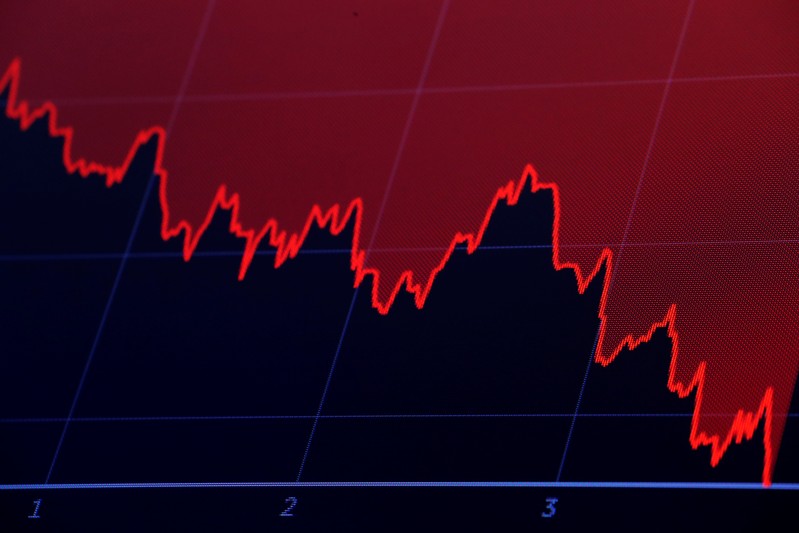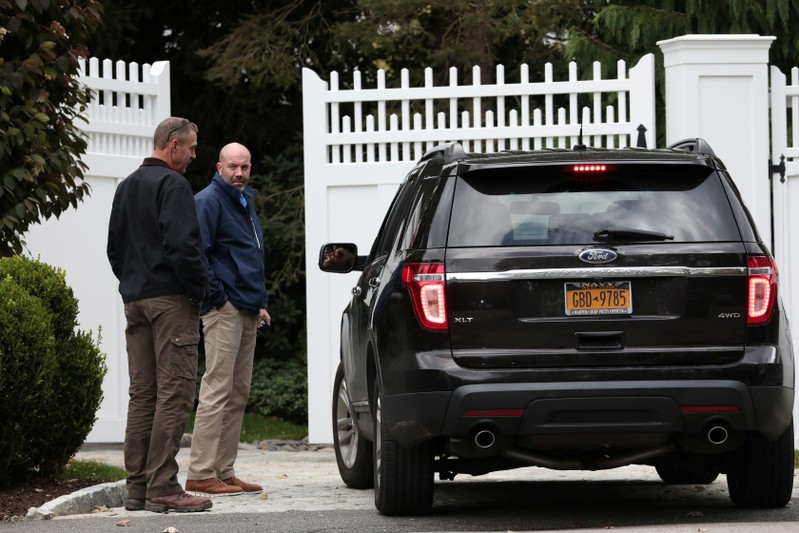
A screen displays a chart of the Dow Jones Industrial Average on the floor of the New York Stock Exchange (NYSE) in New York, U.S., October 24, 2018. REUTERS/Brendan McDermid
October 25, 2018
By Marc Jones
LONDON (Reuters) – Europe attempted a rebound on Thursday, after Wall Street’s worst day since 2011 and heavy losses in Asia put global stocks on course for their worst month since the financial crisis.
It wasn’t a sunny picture by any means. Germany’s DAX <.GDAX> hit a near two-year low and London’s FTSE <.FTSE> and Paris’s CAC 40 <.FCHI> both brushed 1 1/2-year lows early on, but a semblance of stability was emerging.
The pan-European STOXX 600 <.STOXX> climbed back into positive territory after opening down almost 1 percent and after Japan’s Nikkei <.N225> had slumped 3.5 percent overnight.
Currency dealers were also unwinding Swiss franc <CHF=> and Japanese yen <JPY=> safety trades. Italian and Spanish bonds made ground as bond brokers waited to what the European Central Bank’s latest meeting delivers.
“The markets have been acting like classic flight-to-safety markets,” said London & Capital’s head of fixed income, Sanjay Joshi, pointing to the slump in stocks and rally in safer bonds and currencies.
“The worst thing the ECB could do would be to come out with a hawkish statement, considering the situation we have at the moment.”
Most economists expect ECB President Mario Draghi to say the bank will stick to plans to end stimulus this year. But the signal he sends about market volatility and concerns around Italy, his homeland, could be most crucial.
Investors have become increasingly nervous about lofty stock prices, faster interest rate hikes in the United States and an ongoing Sino-U.S. trade war that threatens to hurt world growth.
Almost 60 percent of the 2,767 stocks in MSCI’s global equity index <.MIWD00000PUS> are now in bear-market territory — down 20 percent or more from their most recent peaks.
More woes in Asia overnight had seen the global wipeout on the MSCI World since January near $7 trillion. Pan Asia-Pacific shares <.MIAPJ0000PUS> skidded more than 2 percent while Japan’s Nikkei <.N225> tumbled as much as 4 percent to a six-month low.
The one relief was that Chinese shares managed to close in the black after dropping as much as 2.5 percent at one point. <.SSEC> Fresh government support measures had failed to ease worries about high leverage and the tariff war with the U.S.
(For graphic click https://tmsnrt.rs/2ONOPwD)
“If you’re a company and you’re in charge of a capex budget, there is so much uncertainty about the next few years in terms of a trade war, in terms of Brexit,” said Jim McCafferty, head of equity research, Asia ex-Japan at Nomura.
TALKING TURKEY
Europe’s stabilization was aided by results from Swiss bank UBS and engineering giant ABB <ABBN.S> which helped take the edge off jitters caused this week by a gloomy tariffs warning from the U.S. behemoth Caterpillar <CAT.N>.
Wall Street futures were up between 1 percent for the S&P 500 and Dow Jones and as much as 1.7 percent for the Nasdaq. Wednesday’s after-hours results from Microsoft caused cheer, along with results from the likes of GE, Twitter and Black & Decker. [.N]
The ECB was looming, too. Weak euro zone economic data this week have added to angst over world growth, as has a surprising slump in U.S. home sales, which suggested rising mortgage rates were sapping demand for housing.
It wasn’t just the ECB in action. Turkey, which has stabilized in recent weeks after having been at the center of emerging market troubles, halted its recent rate hikes, which had lifted the lira.
For once the move was in line with economists’ expectations. The bank has almost doubled its rates this year to 24 percent after a 40 percent slump in the lira <TRY=> pushed Ankara to the brink of a full-blown currency crisis.
In main foreign exchange markets, the euro recovered to $1.14 <EUR=>, having breached a long-standing bulwark of $1.1430.
Against a basket of currencies, the dollar eased from near a nine-week peak to 96.296 <.DXY>. For the first time in days it was barely budged against the safety-first Japanese yen at 112.25 yen <JPY=>.
Sterling also inched off a seven-week trough to $1.2887 <GBP=>, having dropped 0.8 percent overnight, and oil prices began to gain, having been dragged down by the concerns over global growth.
Brent crude <LCOc1> was last at $76 a barrel, while U.S. crude was at $66.63 <CLc1> [O/R]. Gold <XAU=> was a tad weaker at $1,236.76 an ounce.
“Expect spirited rallies,” said Robin Bieber, technical analyst at London brokerage PVM Oil.
(Additional reporting by Christopher Johnson in London and Swati Patel in Sydney; editing by Larry King)

